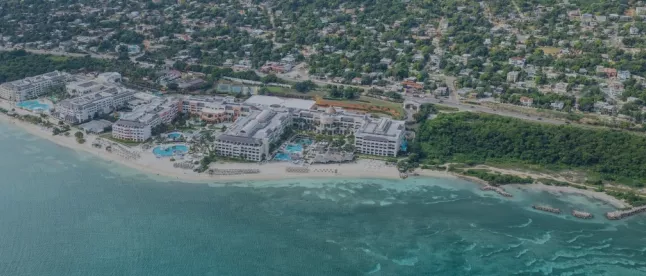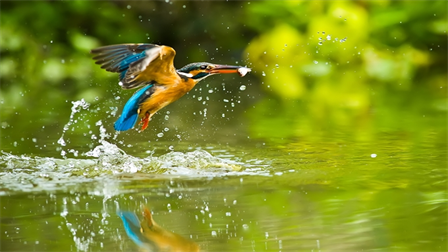Iberostar's Community-Led Marine Conservation in Jamaica
Start Reading

1. Company at a Glance
In this case study, we'll explore how Iberostar Group, a family-owned Spanish hospitality company, is making waves in sustainable tourism with its Grange Pen Fish Sanctuary in Jamaica. Faced with environmental challenges like overfishing and coral degradation, Iberostar recognized the critical link between a healthy ocean and thriving coastal communities. This case study illustrates their holistic approach, integrating environmental restoration with local community empowerment to foster a resilient "blue economy" and secure the long-term well-being of both people and planet.
Hospitality
Industry
1877
Founded
Spain
Headquarters
More than 37,000
Number of Employees
14 countries in Europe, America and Africa (Iberostar Hotels & Resorts)
Global Presence
2. The Challenge
Iberostar launched this initiative in response to alarming signs of ecosystem decline near its Rose Hall hotel complex in Jamaica. Surveys revealed overfishing, coral degradation and the deterioration of vital seagrass beds which are key to carbon capture and coastal resilience.
Recognizing the ocean’s critical role in supporting both biodiversity and coastal livelihoods, the company aligned its efforts with Jamaica’s national conservation goals to protect 30% of its marine areas by 2030 under the Global Biodiversity Framework. The initiative also reflects the company's broader "Iberostar Wave of Change" strategy, which aims to balance environmental restoration with community empowerment across its destinations.
The sanctuary encompasses the sea in front of the Iberostar Rose Hall Complex. As a public space, it remains open and accessible to everyone—both hotel guests and local community members — fostering a shared sense of stewardship and inclusivity in marine conservation.
3. The Action
To bring the Grange Pen Fish Sanctuary to life in 2024, Iberostar began a multi-stakeholder effort rooted in local collaboration in 2019. Key objectives included increasing fish populations, restoring coral reefs, conserving seagrasses and mangroves and preserving water quality. Iberostar covers the operational costs of the sanctuary and is actively exploring additional funding opportunities.
Collaborative Governance and Community Empowerment
- The company co-created the sanctuary in partnership with the Oracabessa Marine Trust, the local fishing community and the National Fisheries Authority of Jamaica, which provided regulatory support and validated the proposed area for sanctuary development.
- Iberostar established the Grange Pen Sanctuary Association as the legal entity responsible for co-managing the sanctuary. The Association is governed by an eight-member board, with equal representation from Iberostar and the local community, ensuring shared decision-making power. It oversees the development of the Annual Operating Plan and the Sanctuary Management Plan, supervises staff and prepares official reports for the government.
- Iberostar engaged the local community from the outset to build trust, foster shared ownership, and align with national conservation goals. In response to declining fish stocks, local fishers approached Iberostar to explore the creation of a fishing sanctuary. Together with government authorities, the community defined the sanctuary’s boundaries.
On-the-Ground Implementation and Local Job Creation
- The sanctuary spans 3.3 million m2, leaving open the possibility of future expansion. It's demarcated by buoys every 200 meters, and mooring buoys will also be installed to regulate access.
- It also deployed operational teams, that includes 4–6 trained Park Wardens with enforcement authority, 3–4 coral gardeners, and a sanctuary manager — creating up to 11 new local jobs that provide sustainable alternative livelihoods linked to ecosystem protection. These positions are currently funded by Iberostar, with long-term financing solutions being explored to ensure the sanctuary’s continued operation. •
- Iberostar also developed a multispecies coral nursery within the sanctuary to restore reef ecosystems and strengthen climate resilience.
Scientific Oversight and Operational Integration
- The company mobilized Iberostar’s Wave of Change sustainability team to design and implement ecological baseline studies and long-term monitoring.
- Iberostar has also integrated conservation efforts into day-to-day hotel operations to ensure alignment between tourism and environmental management.
Global Advocacy and Knowledge Exchange
Iberostar has presented the initiative at international conferences, including the UN Biodiversity and Climate Change COPs. It has also participated in Jamaica’s national fish sanctuary network to share lessons learned and promote co-managed marine protection models.
Raise Local and National Awareness
To build public support and visibility for the sanctuary, Iberostar hosted an official launch event in May alongside the Government of Jamaica. The company also announced the sanctuary through press coverage and its social media channels. As part of the ongoing management plan, further outreach and educational activities are being developed to raise awareness within the local community and beyond.
Our strategy moving forward involves two primary focuses. First, we will enhance community awareness of the sanctuary by working closely with local authorities. Second, we will work with stakeholders to create a comprehensive and inclusive management plan, including spatial planning, ecological KPIs, and measures to safeguard the sanctuary's integrity.”
- Victor Galván, Global Director of Nature, Iberostar Group
4. Overcoming Barriers
Establishing a marine protected area presented social challenges, particularly for local fishers concerned about access and participation in resource management. Iberostar addressed these concerns by building trust through open dialogue, transparency and shared decision-making. By ensuring that the local community had equal representation in the sanctuary’s governance, the company fostered a sense of ownership and inclusion. This collaborative approach not only minimized resistance but also created alternative livelihoods, helping the community see Iberostar as a long-term partner.
5. Impacts & Results
Local Job Creation
The establishment of the sanctuary has generated up to 11 alternative income opportunities for the local community, including positions for park wardens, coral gardeners, and administrative staff. This job creation supports local livelihoods and fosters community engagement.
Ecological Baselines
Established The initiative involved conducting comprehensive ecological studies, including seagrass population assessments and reef health monitoring. These baselines are crucial for tracking the sanctuary's effectiveness and ensuring ongoing ecological health.
Enhanced Coastal Protection
The sanctuary contributes to improved coastal resilience by reducing the risks of storms and erosion, thereby enhancing the ecological health of the beachfront associated with the Iberostar Rose Hall hotel complex. This not only benefits the environment but also improves the guest experience by providing access to a marine sanctuary.
6. Key Lessons Learned
Prioritize Public-Private Collaboration:
Engage in direct community involvement in the design, implementation and ongoing management of the project to ensure local support and leverage existing expertise.
Integrate Initiatives into Core Strategy:
Ensure that environmental initiatives are embedded within the company’s overall strategy and investment plans.
Consider Stakeholder Timelines:
Take into account the timelines and procedural requirements of key stakeholders during the planning phase, and start laying the groundwork earlier in the project.
“We’re already observing that in marine protected areas, there are promising signs of recovery, with increased biomass by over 2,000 per cent, leading to larger catches for fishers, a direct benefit of a sanctuary’s spillover effect.”
Dr. Gavin Bellamy, National Fisheries Authority's CEO
7. Resources
Iberostar has been a committed participant from 2016 and it is a signatory of the Business Ambition for 1.5°C initiative.
Recommended UN Global Compact resources available to support your journey:
Disclaimer: This case example is intended strictly for learning purposes and does not constitute an endorsement of the individual companies by the UN Global Compact.

